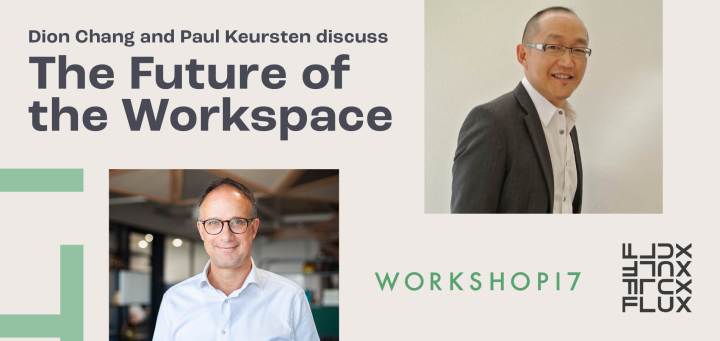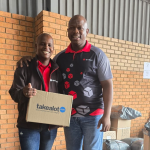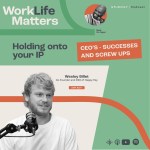SPONSORED CONTENT
The Future of the Workspace

Thanks to the impact of a global pandemic, combined with a rapid escalation of technology and digital services, workspaces as we know them are no longer offering what is needed. The concept of work, how it gets done and where it happens, has fundamentally changed.
WFO (work from the office), the pre-Covid business norm was replaced with WFH (work from home) during Covid, resulting in a major shift in our workplace thinking. Post-Covid the WFH is fast becoming the WNH, (work near home) tapping into an inspiring and functional work environment and community close to where you live. While many have decided they don’t have to live close to the office, sparking a rise in semigration and remote workers, giving rise to WFA (Work from anywhere) . As the workplace continues to evolve, we chat to Dion Chang, South Africa’s most respected trend analyst and founder of Flux Trends and Paul Keursten, Co-Founder of Workshop17, about its tectonic shift, its impact on individuals and businesses, and its future.
Q: Paul: Workshop17 has been successfully operational for the last 10 years, with the increase in flexible workplace practices, how has Workshop17 shifted its focus to include a post Covid workplace strategy?
A: The focus is now on convenience and community. As the demand for remote and coworking platforms increases, the need for these to be part of everyday life grows – closer to home, gyms, shops, transport hubs and eateries. We are looking to grow in residential nodes. Our focus at Workshop17 is to identify locations that serve communities, allowing individuals to work near home, with access to their familiar amenities, while avoiding wasted time, frustrating long commutes, expensive travel costs and inner city parking fees.
Q: Dion: As we move towards a reopened world and a rise in hybrid working, coworking locations are now referred to as the 3rd space – what does this mean and what are the new workspace trends we should be talking about?
A: Coworking spaces are called third spaces as they offer employees and employers a community outside of their workplace and home that promotes personal and professional development and support. It is a space where ideas come to life and like-minded people connect around an idea, a cause or even a project. Normally third spaces like malls change according to the ever evolving needs of its patrons – in this case the sense of belonging, the sense of community. Workspace trends will veer towards a hybrid (real estate, retail and work) model that allows for people to enjoy the relaxed environment of home, while also working and connecting with their colleagues and employees from other companies. They also offer an opportunity, outside of the confines of the workplace, to form new and meaningful business connections.
Q: Paul: As the number of remote workers continues to grow, so too will the demand for remote-friendly policies and tools for employees. How is Workshop17 serving the hybrid working trend?
A: We have created more flexible offers, which have become popular with larger companies that have a dispersed workforce. One example is our Flexi-connect membership, which works like buying airtime for your mobile phone: you only pay for what you use and can top up when needed. We recently contracted with a company with 250 staff, that cancelled their office lease and allows their staff to work and meet in any of our locations. Another example is allowing companies to take smaller dedicated space with added flexible membership. We have a company that has a dedicated space for 12 people, that is being used by 20 people on a rotational basis, and they have roaming memberships to access our other locations.
Apart from the physical space, we have enhanced our IT offering and member software platform. We offer corporate grade connectivity and data security, something often overlooked when working from home. We developed an app which makes the booking and use of our spaces very easy for members, and which also allows members to connect to each other. And we pride ourselves to have developed digital wallets, which makes our spaces cashless and allows companies to manage their expenses and the use of our facilities very flexibly.
Q: Dion: With the increase in remote working opportunities, the conventional work arrangement is becoming more diverse. Companies are starting to reconsider the standardised 9-to-5, 5 days a week office approach, but rather adopting ways to create flexible, equitable spaces that motivate and drive employee engagement, innovation and growth. The lines between work and personal life have become increasingly blurred. Do you believe the “weekday, 9-to-5” society is a relic of the past?
A: In certain sectors yes, but the increase in demand for certain goods and services within the retail, logistics, technology and hospitality industry have made it difficult to give essential staff more flexible hours and remote options as this impedes on service delivery, however companies, specifically Apple are trialling a new approach to retail which allows their retail employees to enjoy more flexibility and other responsibilities in their roles. Like any work environment the transition has not been smooth with a push-back from employees regarding this plan, hence why a third space or a remote workspace option is a happy medium as it gives employees a soft and comfortable entry back to the office while allowing work to continue without having all your staff under one roof.
Q: Paul: Wellness in the workplace is now more critical than ever before, how does Workshop17 create inclusivity and wellness amongst its work community?
A: Member wellbeing is at the essence of what Workshop17 is all about, creating workspaces that not only incorporate the needs of our members, but create an experience for them. Together with strategic partners like (Heavy Chefs, Flux Trends, Entrepreneurs Organisation, we offer discounted partner training and learning platforms. We create monthly meetups, community and networking events across all locations to engage our diverse communities of creative, corporate, entrepreneurial businesses and people. Our workspaces are conducive to collaboration and connection which is known not only to boost productivity, but more importantly positivity. The added benefits of our in-house and partner catering services are wholesome and nutritious and allow our members an essential break from their desks. Our frictionless serviced spaces with breakout zones, cafés and pause areas contribute to reduced stress.
Q: Dion: How do you see the experiential workspaces evolving even further?
A: The experiential workspace will evolve to address privacy and space (additional and recreational). These are areas which are starting to be of concern to those who have been using coworking spaces. Another factor that is usually overlooked is outdoor spaces or exposure to nature to get some fresh air, sunlight and stretch one’s legs. Elements that bring the outdoors in will also impact on whether people join coworking spaces or return to work because they have been cooped up for two years and want to stretch their physical and mental legs. There are some companies that are addressing the need for a more biophilic approach to design and incorporating nature into their design and workspaces in order to attract or retain employees. DM




















 Become an Insider
Become an Insider
Comments - Please login in order to comment.